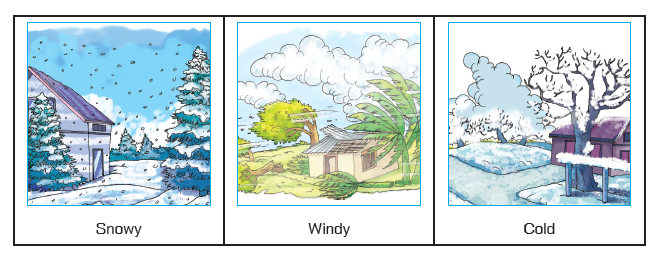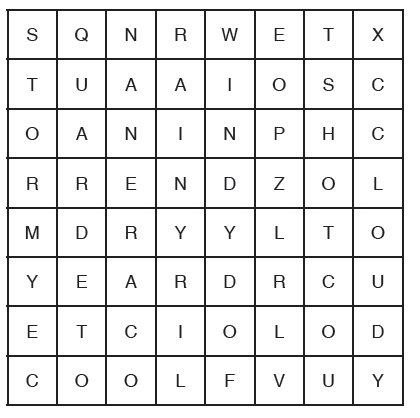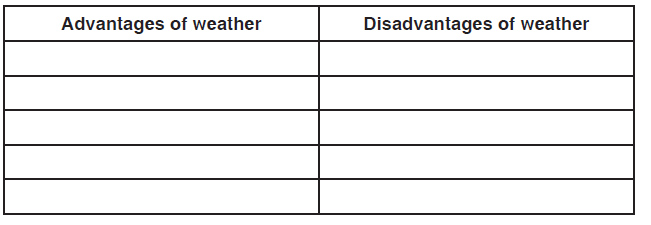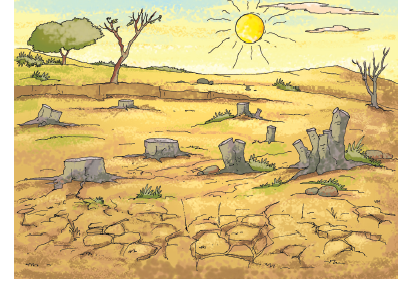UNIT4:WEATHER
TOPIC 1 Talking about Today’s Weather
Activity 4.1.1 (READING)Learn the weather words. Read aloud.

Activity 4.1.2
Find ten weather words by drawing a circle around each one of them inthe puzzle.
Activity 4.1.3
Read about today’s weather.
1. What is the weather like?
Ans. Today it’s sunny.
English Textbook 49
2. What’s the weather like today?
Ans. Today the weather is rainy.
3. What’s the weather like today?
Ans. Today there is a lot of lightning.
4. What is the weather like today?
Ans. Today the weather is sunny.
Answer the Riddle
What comes down and never goes up?
Activity 4.1.4 (WORKING TOGETHER)
With a partner, make questions and answers like those above. Remember to
use different weather vocabulary.
TOPIC 2 Talking about Weather in the Past
Activity 4.2.1 (READING)
• Can you try to remember what the weather was like last week, or
yesterday?
1. What was the weather like last week?
Ans. Last week it was rainy.
2. What was the weather like yesterday?
Ans. Yesterday, it was cool.
3. What was the weather like last month?
Ans. Last month it was mostly dry.
4. What was the weather like last year?Ans. Last year, it was wet.
Activity 4.2.2
Form questions and answers from the table. Interpret the pictures and write theanswers.
For example: • What was the weather like yesterday?
• Yesterday, it was hot.
TOPIC 3 Weather in Rwanda
Activity 4.3.1 (READING)
Read the following text.
The weather of Rwanda comprises four seasons: two wet seasons and two dry
seasons. The first wet season is short. It lasts from October to November.
The second wet season is the main wet season. It is longer than the first one.
It lasts from the middle of March up to the end of May. During these seasons, it
is rainy and cold. Farmers plant their crops during these seasons because the
land is soft and moist. Cultivation is easier.
The third season is the first dry period. It lasts from December up to mid-March.
The fourth season is the second dry period. It lasts from June up to the end of
August. During these periods, it is mostly sunny and partly cloudy. The land is
too dry and places are dusty. Farmers cannot plant any new crops.
On an average, the hottest month is August. The coolest month is May. April isthe wettest month and July is the driest month.
Activity 4.3.2
Complete these questions.
Rwanda has .................... seasons. These are .................... The first wet
season is from .................... up to .................... The second wet season is from
.................... up to .................... .
Activity 4.3.3
Answer the following questions.
1. Which month is the coolest?
2. What is it like in January?
3. What do farmers do during the wet season?4. Which months are dusty and dry?
Activity 4.3.4 (WORKING TOGETHER)
Work in groups. Fill in the chart below with the appropriate weather conditionsfor each month as explained in the passage.
Answer the Riddle
What is the next in the sequence ‘JFMAMJJASON’?........The chart below shows the number of rainy days during the year.
• The vertical axis shows the number of rainy days.
• The horizontal axis shows the months in a year.
Activity 4.3.5
Study the bar graph above and talk about the rainy months in a year.
Answer the following questions.
1. In which month does it rain very much?
2. Which month has the least number of rainy days? …………………….
3. In which months are the rainy days the same?
4. How many days does the month of January receive rain?
5. How many days does the month of April receive rain?
6. How many days does the month of July receive rain?
7. How many days does the month of December receive rain?
Activity 4.3.7 (WORKING TOGETHER)
Discuss the number of days your village receives rain in each month and writeabout it in one paragraph.
Answer the Riddle
What goes up when rain comes down?
TOPIC 4 Talking about the Weather in Our District
Activity 4.4.1 (READING)
Read the passage about Nyarwaya.
My name is Nyarwaya. I come from Karongi district. In our district, it is the dry
season in June. I don’t like the dry season because it is very hot and dusty. I
walk to school. When I get to school, my feet are dusty. I am always thirsty and
tired. My parents do not like the dry season because the gardens are dry and
the crops do not grow well. There are no green vegetation. The cows, goats
and sheep are thirsty and hungry. People are always ill because the dust gets
into their nose and eyes.
I like swimming during the dry season. My little brother likes playing at thebeach in Karongi.
We get the rainy season in April. I like the rainy season. When it rains, I like
playing with my friends. We go sliding in the mud and we also make little boats.My sister does not like the rainy season because she hates mud.
Activity 4.4.2Answer True or False.
Answer the following questions.
1. What is the name of Nyarwaya’s district?
2. When is the wet season in Nyarwaya’s district?
3. Why does Nyarwaya hate the dry season?
4. What do Nyarwaya and his friends do during the dry season?
5. What does Nyarwaya’s brother like doing during the dry season?
6. What activities does Nyarwaya do during the wet season?
7. Why does Nyarwaya’s sister hate the wet season?
Activity 4.4.4
Complete the following statements with what you do in different kinds of
weather.
For example: When it is sunny, I play outside.
(i) When it is rainy, ……………………………. .
(ii) ………………………, I wear a jacket.
(iii) When it is cloudy, ……………………………. .
(iv) ……………………….., I like swimming.(v) When it is windy,……………………………. .
Activity 4.4.5
1. Get to your groups. Think about the weather patterns in the last four
months in your district.
2. Now write a paragraph describing the weather patterns and what you did
during those seasons.
Answer the Riddle
A man was driving his car. His lights were not on. The moon was not out.In front, a woman was crossing the street. How did he see her?
TOPIC 5 Describing the Advantages and Disadvantages
of the Weather
Activity 4.5.1 (LISTENING)
Listen to your teacher reading out a text about the advantages and disadvantages
of weather.
Activity 4.5.2
As you listen, outline the advantages and disadvantages of weather usingthe table below.
Activity 4.5.3
Use the information of Activity 4.5.2 to match the following sentences.
Activity 4.5.5 (WORKING TOGETHER)
In your group, discuss what can be done to prevent the bad effects of weather.
Write what you have discussed in your notebook.
Activity 4.5.6
Take action now to show how you respect the environment. What are thedifferent ways in which you can help make your environment healthy.
Common word endings and families
Apart from sunny, write any other words you know of about the weather thatend with ‘y’.
Activity 4.5.7
Read the poem and discuss questions about it.
Climate Change, Climate Change
The world is getting warmer,
No rain at all.
There are more floods
Because of human activities.
Climate change, climate change.
We are cutting down trees,
Setting up many industries,
People are burning bushes,
Overgrazing is too much.
Misuse of swamps and
58 English Textbook
A lot of charcoal burning.
Climate change, climate change.
As a result,
Gases from industries have destroyed the Ozone layer.
Sunshine is too much and
Temperatures are going up.
The Arctic ice is melting.
Pollution is too much and
Sea levels are rising
The world is getting warmer.By Rehema. M
Discussion Questions
1. What is the poem about?
2. Give two reasons why the world is getting warmer.
3. How are too many industries dangerous?
4. Who wrote the above poem?
5. What is overgrazing?
6. Suggest two causes of climate change.
7. Why is bush burning bad?
8. What is happening to sea levels?9. Why are temperatures moving up?
Table of contents
click here for a video lesson on Adjective
click here for a video lesson on Adjectives
click here for a video lesson on: weather in our district
advantages and disadvantages of weather
click here for a video lesson on: Things that describe weather
click here for a video lesson on: Weather conditions
click here for a video lesson on: weather in Rwanda
click here for a video lesson on: Describing the uses of physical features
click here for a video lesson on:Helping at home
click here for a video lesson on:Jobs and Role
click here for a video lesson on: community work
click here for a video lesson on: how often do you jobs
click here for a video lesson on: community work
click here for a video lesson on: how often do you jobs
PRIMARY FOUR CONSOLIDATED ENGLISH EXERCISE
